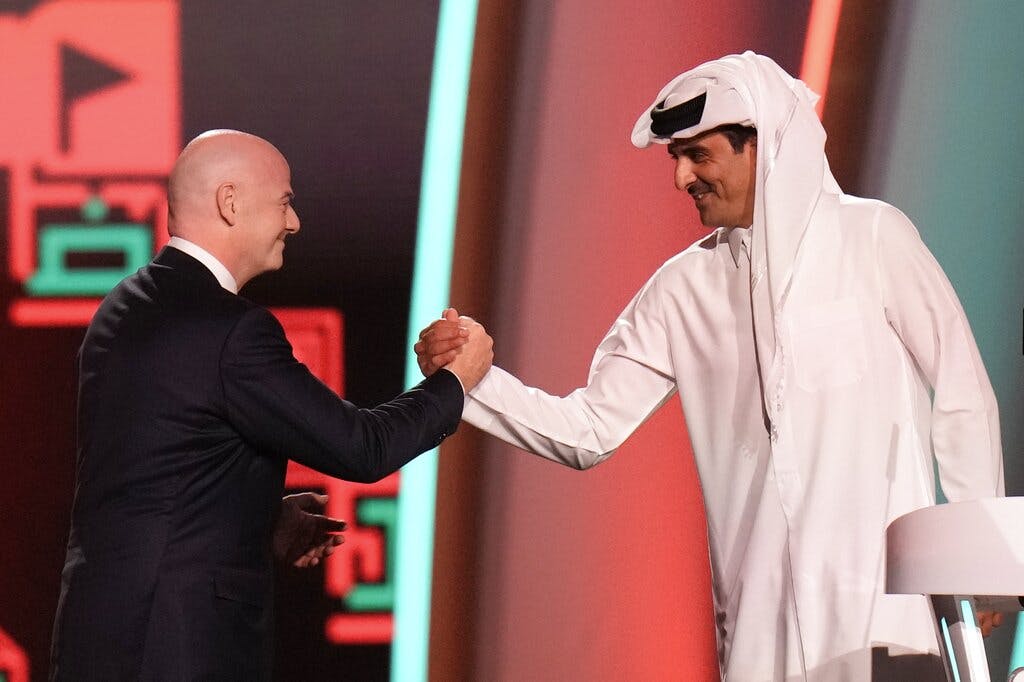World Cup Overseers Want To Kick Politics to the Curb
Good luck with that, FIFA, considering the seriousness of the allegations against it and host Qatar, and the tensions among many of the countries involved. Should the Americans even agree to face the Iranians?

With the 2022 World Cup’s first match at Doha set for November 20, the sport’s governing body, known as FIFA, wants everyone to concentrate on soccer rather than on politics or ideological battles. Leave your protests at home, FIFA says.
Americans have long made a sport of mixing politics and athletics, from President Carter’s boycott of the 1980 Olympics over the Soviet invasion of Afghanistan to last night’s suspension of an NBA star, Kyrie Irving of the Brooklyn Nets, amid allegations of antisemitism.
Not so in Qatar, if the FIFA poobahs have their way. They are begging players and fans to leave politics aside and just enjoy the “beautiful game.” We’re supposed to forget about how Qatar got to host the world’s most-watched sporting event — reportedly by bribing FIFA officials — and those making way to the soccer stadiums are asked not to dwell on how many slave laborers were sacrificed to make the tournament happen.
They also want you to root for your country to win — but do so tactfully, without any allusion to problems associated with the governments of the opposing teams. So, please, Americans, don’t fret that one of Team USA’s first World Cup rivals on the field, the Iranian squad, represents a regime that bans women from soccer stadiums.
“Please, let’s now focus on the football,” FIFA’s president, Gianni Infantino, and its secretary general, Fatma Samoura, wrote in a letter to the 32 teams participating in World Cup Qatar 22. “We know football does not live in a vacuum and we are equally aware that there are many challenges and difficulties of a political nature all around the world,” they wrote, “but please do not allow football to be dragged into every ideological or political battle that exists.”
Will teams and players give up an opportunity to wear their ideological or political views on their sleeves?
The FIFA letter, perhaps, was meant as a pushback against the intention of team captains from England, Wales, and six European teams to wear “One Love” armbands in protest of Doha’s anti-LGBTQ laws. Some captains have already vowed to defy any FIFA attempt to muzzle their expressions of solidarity with oppressed Qataris.
Meanwhile, media bigwigs will be hard-pressed to completely ignore the checkered history of the current World Cup. Doha allegedly bribed several voting FIFA executives, according to 2020 Department of Justice indictments. This followed Russia being implicated in buying its way to hosting the 2018 tournament.
FIFA has long been considered a cesspool of corruption, so it makes sense for its executives to discourage world fans from addressing such concerns rather than cheering on soccer idols who can boost national pride. Most fans no doubt will tend to abide.
Some will also likely push aside concerns about how tiny Qatar, which has invested more than $220 billion in preparation for the extravaganza, has abused migrant workers from India, Nepal, Bangladesh, Pakistan, and Sri Lanka to build the stadiums, roads, and hotel installations for the soccer matches. More than 6,500 such laborers, working in near slavery condition, have died in Qatar since it was awarded the cup.
Yet will commentators on the Fox network, which has acquired the rights to broadcast the games in America, or other world media heed FIFA’s call to ignore such concerns? The question is especially pertinent in America, where politics increasingly and often interferes in sports.
In 2016 a quarterback for the San Francisco 49ers, Colin Kaepernick, began kneeling while the “Star Spangled Banner” was played before games, as is the tradition with the National Football League. His form of protest against racism spread from the NFL to other sporting associations.
Basketball, baseball, and football players, coaches, and executives joined Mr. Kaepernick by taking a knee during the playing of the national anthem. The protest peaked in 2020, being used to address police brutality, poverty, climate change, and other perceived injustices — including, notably, just about anything involving President Trump.
Some of the causes and outrages expressed by multimillionaire athletes have failed to age well. Last year, the Major League Baseball commissioner, Robert Manfred, took the All-Star Game out of Atlanta to protest newly enacted election laws in Georgia. Democrats claimed at the time that the laws are racist and suppress voting rights. Yet, in early voting this year Georgia is marking new voter participation records, making its voting laws now seem far from restrictive.
If at one time the separation of athletics and politics was an ideal worth striving for, that is no longer the case. In a world where outrage dominates all social discourse, soccer stars will find it difficult to remain mum about real and perceived injustices.
So, on November 29, when Team USA plays its second game of the tournament against its Iranian counterpart, our soccer players would do well to ignore FIFA’s instructions and somehow acknowledge the outrages inflicted by the Islamic Republic on the Iranian people. Instead of taking a knee, why not walk off the field and refuse to play?

